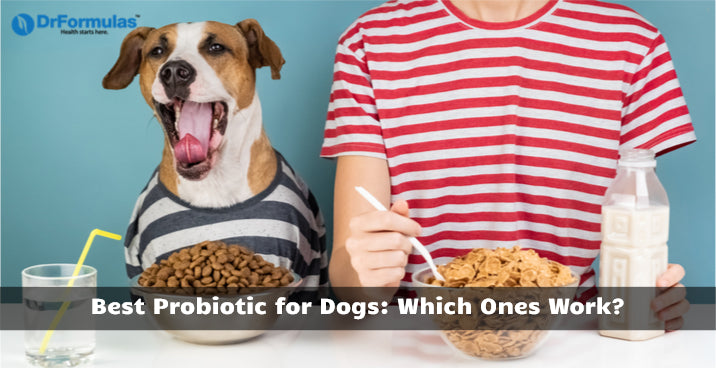
While dogs may be known for their lovable attitudes and powerful stomachs, even the mightiest of these beasts comes down with the occasional case of diarrhea. Often the best remedy for diarrhea is time, but probiotics may help to shorten that time and soothe your dog’s digestion. Read on to learn more about some of the best probiotics for dogs with diarrhea.
The Canine Gut Microbiome
It might seem like your dog can eat just about anything and be fine, but the canine microbiome is actually highly similar to the human microbiome. Part of this comes from the similar gastrointestinal anatomy, metabolic processes, dietary patterns, and intestinal disease etiology shared between humans and domesticated dogs. Part of the similar gut microbiome is a result of close proximity between humans and dogs, who now sleep, eat, and play with their owners. Reports even suggest a link between human illness and dogs.1
Can Your Give Dogs Probiotics?
YES. Studies found phylogenetic and metabolic similarities in the intestinal microbiomes of dogs, humans, and mice. More research is necessary to further understand the canine microbiome, but these studies identify specific microbial strains throughout the canine gastrointestinal tract. Species of Lactobacilli were present throughout the digestive tract, while Enterobacteria were more prevalent in the small intestine than the colon. Clostridia were present in the jejunum and duodenum, while the ileum and colon featured more Fusobacteria and Bacteroidales.1
These initial studies also show that, similar to humans, dogs may experience intestinal diseases as a result of alterations in small intestinal microbiota. For example, duodenal samples from dogs with inflammatory bowel diseases showed a reduced species richness and diversity.1
Dog Food with Probiotics
1. Purina Probiotic Dog Food for Small Breeds
2. Purina Probiotic Dog Food for Big Breeds
Dog Probiotic Powder
1. DrFormulas Probiotic Powder for Dogs
2. Purina Probiotic Powder Packets for Dogs
Probiotics for Dogs Benefits
So can you give a dog probiotics for diarrhea? The research suggests that probiotics for dogs may be helpful for antibiotic-associated diarrhea, acute canine gastroenteritis, diarrhea among kenneled dogs.
1. Antibiotic Associated Diarrhea in Dogs
There have been several studies on probiotics and their effect on dogs with diarrhea. In one study, researchers administered lincomycin (a common antibiotic) to 24 dogs, causing diarrhea.
The dogs were divided into three groups. The first group acted as the control. The second group was given a Saccharomyces boulardii probiotic after diarrhea was induced. The third group was given the S. boulardii probiotic at the same time as the lincomycin.
Researchers found that the third group given both the antibiotic and the probiotic at the same time did not experience any diarrhea. The second group that was administered probiotic after receiving antibiotic did experience diarrhea, but the duration was significantly shorter than the first group, which was just given antibiotics. This suggests that S. boulardii was effective in both treating and preventing diarrhea caused by linomycin.2
2. Acute Canine Gastroenteritis
In another study, researchers evaluated the effects of probiotic intervention in dogs with acute canine gastroenteritis. Thirty-six dogs with acute diarrhea or acute diarrhea and vomiting were split into groups that received either a placebo or a probiotic treatment. The probiotic cocktail contained a thermo-stabilized Lactobacillus acidophilus mixed with live strains of Pediococcus acidilactici, Bacillus subtilis, Bacillus licheniformis and Lactobacillus farciminis.
Researchers found that dogs given the probiotic treatment had a significantly shorter period with diarrhea (an average 1.3 days) than the placebo group (an average 2.2 days). This further suggests the effectiveness of probiotics in limiting the symptoms of acute diarrhea in dogs.3
3. Diarrhea in Kenneled Dogs
Diarrhea is particularly common among kenneled dogs in animal shelters. A double-blind, randomized, placebo-controlled trial looked at the effects of a probiotic-prebiotic supplement in 773 dogs entering an animal shelter. The probiotic comprised a strain of Enterococcus faecium. Results of the trial showed that the dogs given the probiotic-prebiotic supplement showed a significantly reduced incidence of diarrhea, suggesting it may be a beneficial option for avoiding acute diarrhea and improving the welfare of dogs entering animal shelters.4
A similar study in the United States looked at the effect of probiotic supplements on healthy dogs experiencing diarrhea, loose stools, and general gastrointestinal disturbances as a result of kennel stress. Researchers assigned 134 healthy, young adult dogs to four groups (one control group and three groups with varying CFU doses of Bifidobacterium animalis). Each dog received a daily oral supplement for five weeks prior to kennel relocation and the first three weeks after relocation.
Researchers measured the number of defecations per day, fecal microbial populations, and serum cortisol levels before and after kennel relocation. Results showed significantly higher fecal scores (less diarrhea) in dogs treated with the Bifidobacterium animalis supplement compared to the control group.
This evidence suggests that providing healthy dogs with a probiotic supplement containing Bifidobacterium animalis before and during kennel relocation may support optimal stool production and prevent stress-induced diarrhea. The study recommended effectiveness in servings that ranged from 10 million to 1 billion CFUs.5
Probiotics may play a vital role in reducing or preventing diarrhea in dogs. Dogs can take human-grade probiotics, but you may have to adjust proportions and servings as dogs naturally have a more carnivorous diet. When choosing natural probiotics for dogs, look for a supplement that is optimized for dogs and their unique gut microbiome, such as DrFormulas® Nexabiotic® Probiotics for Dogs.
Sources:
- https://www.nature.com/articles/ismej2010162
- https://pdfs.semanticscholar.org/4fbd/6d8339f10cbd15f15bcc471dba4b2e4a4e63.pdf
- https://onlinelibrary.wiley.com/doi/full/10.1111/j.1748-5827.2009.00853.x
- https://onlinelibrary.wiley.com/doi/full/10.1111/jvim.14666
- http://cel.webofknowledge.com/InboundService.do?customersID=atyponcel&smartRedirect=yes&mode=FullRecord&IsProductCode=Yes&product=CEL&Init=Yes&Func=Frame&action=retrieve&SrcApp=literatum&SrcAuth=atyponcel&SID=7DqGzHn6xQqvkO2jHWn&UT=WOS%3A000312178800003


